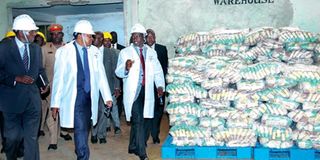Farmers in agony despite Sh1bn bailout for Mumias

President Uhuru Kenyatta and Deputy President William Ruto (right) tour Mumias Sugar Company in 2015. Amani leader Mr Musalia Mudavadi has accused Jubilee and Cord coalitions of colluding to ensure a report on the sugar crisis is not table in Parliament. PHOTO | PSCU
What you need to know:
- Miller’s fortunes won’t change overnight due to cane shortage and huge debts.
- Growers told their accounts are in debit, with all earnings being used to settle charges.
For Mr Daniel Indakwa, a sugarcane farmer in Eluche, Kakamega County, President Uhuru Kenyatta’s Sh1 billion Mumias Sugar Company bailout is like treating mourners to a feast at the funeral of a man who has died of starvation.
In his last encounter with the miller’s managers, Mr Indakwa says he was told he owes the firm Sh7,500 after delivering his cane. He was expecting about Sh50,000 after the deduction of pre-harvest charges incurred on his one-acre farm.
Like many other farmers, all his earnings had gone into settling the service charges.
“I was in shock. After waiting for two years for the cane to mature, I have to return home empty-handed,” he says.
Despite the bailout, he says, he will uproot the cane and grow maize instead.
Mr Indakwa says the high cost of transporting cane from farms to the factory, and the charges for preparation of land, cane seed and fertiliser take too much away from farmers.
He was charged Sh800 for each tonne of cane delivered to the factory, yet his farm is only about six kilometres from the factory.
PILING PRESSURE
Mr Indakwa’s case is replicated in Butere, Matungu and Navakholo, in Kakamega County, Nambale and Teso, in Busia County, and in parts of Siaya County, where farmers have gone for five months without pay.
There is a cloud of scepticism that despite the State’s gesture, the miller’s fortunes will not change overnight.
Under the Western Parliamentary Group, elected leaders have been piling pressure on the government to help save the company from collapse.
Mumias East MP Benjamin Washiali wants farmers to be assisted to acquire their own tractors to solve the problem of exorbitant transportation costs.
He sees the Mumias bailout as a drop in the ocean.
Ms Judith Imbiakha, also a farmer in Eluche, is in a similar dilemma. She planted cane expecting good returns but after her visit to the sugar factory on Wednesday, she says she does not know whether it is a good idea to continue growing sugarcane after she learned she had a debit of Sh6,700.
“My children and I have been spending long hours weeding the five-acre cane farm. Ending up without any money after waiting for two years is unacceptable,” she says.
Mr Simeon Wesechere, the deputy secretary-general of the Kenya National Sugarcane Federation of Farmers, says farmers should be supplied with early maturing varieties to ensure sustainable supply to the firm.
Mr Alloys Mandu, the chairman of Mumias Cane Farmers Co-operative Union, says cane should be weighed on the farms to minimise losses due to spillage.
On Wednesday, President Kenyatta directed the firm’s management to engage the government over its debts with a view to having them written off. “A farmer cannot develop sugarcane and, after making deliveries to the factory, he or she is told to instead pay the miller,” he said.






